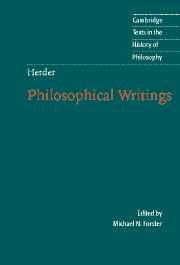Book contents
- Frontmatter
- Contents
- Introduction
- Chronology
- Further reading
- Note on the texts and translation
- Part I General Philosophical Program
- Part II Philosophy of Language
- Part III Philosophy of Mind
- Part IV Philosophy of History
- Part V Political Philosophy
- Letters concerning the Progress of Humanity (1792) [excerpts on European politics]
- Letters for the Advancement of Humanity (1793–7) [excerpts concerning freedom of thought and expression]
- Letters for the Advancement of Humanity (1793–7) [excerpt on patriotism]
- Letters for the Advancement of Humanity (1793–7) – Tenth Collection
- Index
- Cambridge texts in the history of philosophy
Letters for the Advancement of Humanity (1793–7) [excerpts concerning freedom of thought and expression]
Published online by Cambridge University Press: 05 June 2012
- Frontmatter
- Contents
- Introduction
- Chronology
- Further reading
- Note on the texts and translation
- Part I General Philosophical Program
- Part II Philosophy of Language
- Part III Philosophy of Mind
- Part IV Philosophy of History
- Part V Political Philosophy
- Letters concerning the Progress of Humanity (1792) [excerpts on European politics]
- Letters for the Advancement of Humanity (1793–7) [excerpts concerning freedom of thought and expression]
- Letters for the Advancement of Humanity (1793–7) [excerpt on patriotism]
- Letters for the Advancement of Humanity (1793–7) – Tenth Collection
- Index
- Cambridge texts in the history of philosophy
Summary
The more and the more easily messengers reach everywhere here, everywhere there, then the more the communication of thoughts is advanced, and no prince, no king will seek to hinder this who understands the infinite advantages of the mind-industry, of mind-culture, of the reciprocal communication of inventions, thoughts, suggestions, even of mistakes committed and weaknesses. Every one of these things benefits human nature, and hence also society; the mistake gets discovered, the error gets corrected, thought awakens thought, sensations and decisions stimulate and motivate.
Free investigation of the truth from all sides is the sole antidote against delusion and error of whatever sort they may be. Let the deluded person defend his delusion, the person who thinks differently his thought; that is their business. Even if both of them fail to be corrected, for the unbiased person there certainly arises out of every criticized error a new reason, a new view of the truth. Let it only not be believed that truth can ever be captured, or even kept fast in jail for eternity, by means of armed delusion! Truth is a spirit and communicates itself to spirits almost without a body. Often its sound may be stirred at a single end of the world, and it resounds in remote lands; but the river current of human cognition always purifies itself through oppositions, through strong contrasts. Here it breaks off, there it starts; and in the end a long- and much-purified delusion is regarded by human beings as truth.
- Type
- Chapter
- Information
- Herder: Philosophical Writings , pp. 370 - 373Publisher: Cambridge University PressPrint publication year: 2002



